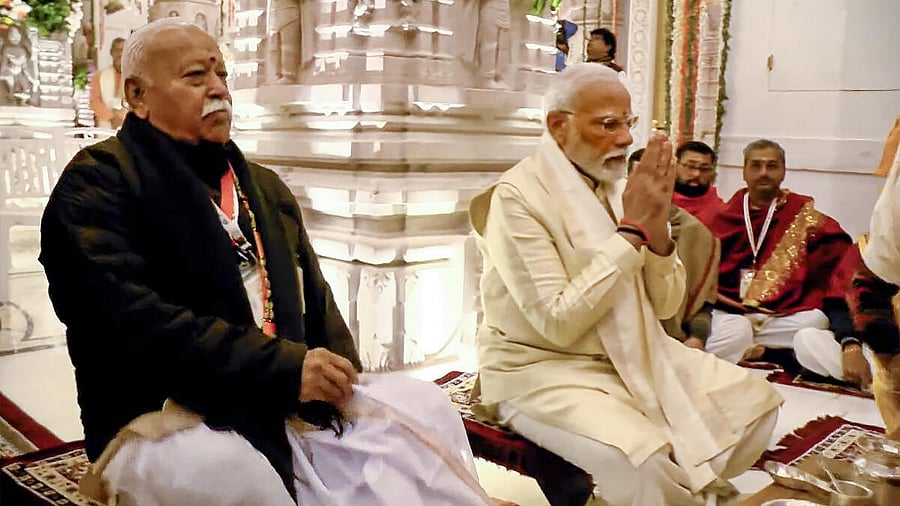
RSS chief Mohan Bhagwat with PM Narendra Modi at the Ram mandir consecration.
Credit: PTI Photo
On August 15, as Prime Minister Narendra Modi addressed the nation from the Red Fort, he made several important announcements regarding national security, jobs, self-reliance, and GST reforms. Tucked within his 103-minute speech, said to be the longest Independence Day speech by an Indian prime minister, was a historic moment – an acknowledgement of the 100-year journey of the Rashtriya Swayamsevak Sangh (RSS) and its contribution to nation-building.
The Prime Minister extolled the organisation for its seva to the nation and paid tribute to the RSS swayamsevaks for dedicating their lives to vyakti nirman (character-building) and rashtra nirman (nation-building). Calling it the ‘world’s biggest NGO’, Prime Minister Modi said seva (service), samarpan (dedication), sanghatan (organisation), and apratim anushasan (unparalleled discipline) form the identity of the organisation.
Why is this such an important moment in the political history of post-Independent India? Often hailed as the ideological fountainhead of the Bharatiya Janata Party (BJP) and the larger Sangh Parivar, the RSS was established in 1925 by Dr Keshav Baliram Hedgewar. What began as a coterie of five hand-picked swayamsevaks by the founder himself quickly expanded to become a cultural and political movement that dedicated itself to ‘nation building’ with a distinct Hindu nationalist overtone.
Post-Independence, the organisation was banned thrice; the first time, after Mahatma Gandhi’s assassination in 1948, the second, during the Emergency in 1975, and for a third time, soon after the Babri Masjid demolition in 1992. Perceived as a clear threat to the idea of Indian secularism by its detractors, RSS has been consistently marginalised in official state narratives and derided as a ‘communal’, ‘unpatriotic’ and ‘violent’ movement. Despite political marginalisation, the organisation continued to steadily build grassroots influence through its shakhas and initiatives in education, public health and related fields.
The recognition coming from PM Modi, who was once an RSS pracharak himself, is no small achievement for a movement that has traversed from being on an ideological fringe to now being an accepted part of India’s State-sanctioned national identity. In some ways, it crystallises the RSS’s gradual integration into the political structures it once critiqued and subtly completes a journey of normalisation.
For several decades, critics have mocked the Sangh Parivar for their alleged lack of participation in the freedom movement. The inclusion of RSS history in a national address by the most powerful political authority challenges and perhaps even reorders the hierarchy of established national contributions. Further, by drawing attention to seva, samarpan, sanghatan, and anushasan as the RSS’ defining characteristics, the Prime Minister presents it not just as a legitimate actor within the national fold, but as an equally patriotic model alongside, or perhaps, even in contrast to, more familiar frameworks of the Nehruvian, Gandhian, or Leftist visions.
The politics of memory
Every nation, from time to time, curates its history. Who is remembered and who is excluded from it often reveals not just the past, but also the priorities of the present. For several decades after Independence, the Indian State eulogised a particular version of nationalism which was considered more inclusive, secular, and rooted in the freedom struggle led by the Congress. The RSS, with its alternative vision of nationhood, was excluded from this history. In less than two minutes of his speech, Modi quietly sought to rewrite that script. By acknowledging RSS as a contributor to the nation’s development story, he granted it legitimacy as a part of India’s social and historical framework.
There are broadly two ways of looking at this: first, does the acknowledgement of one ideological strand come at the cost of marginalising or burying the other? Or is this an important broadening of the national story and a long-overdue nod to multiple contributions to India’s nation-building project?
While RSS and BJP supporters have hailed the reference as a rightful recognition of a century of national service, opposition parties have expressed disappointment. Congress leader Jairam Ramesh called it the ‘most troubling element’ of the speech and a ‘blatant breach’ of the spirit of a constitutional, secular republic. Asaduddin Owaisi called the RSS praise ‘an insult to the freedom struggle’, alleging that the RSS and its allies ‘served as British foot soldiers’ and ‘hated Gandhi more than they ever opposed the British’.
But beyond the political debates, there is an underlying reality. The inclusion of RSS in the national narrative signals the attempt to forge a new consensus. It reminds us that national narratives are not static. The idea of India, after all, is not a single story but many competing stories. On certain key occasions, we choose which ones to tell.
(The writer is a faculty at Azim Premji University, Bengaluru)
Disclaimer: The views expressed above are the author's own. They do not necessarily reflect the views of DH.